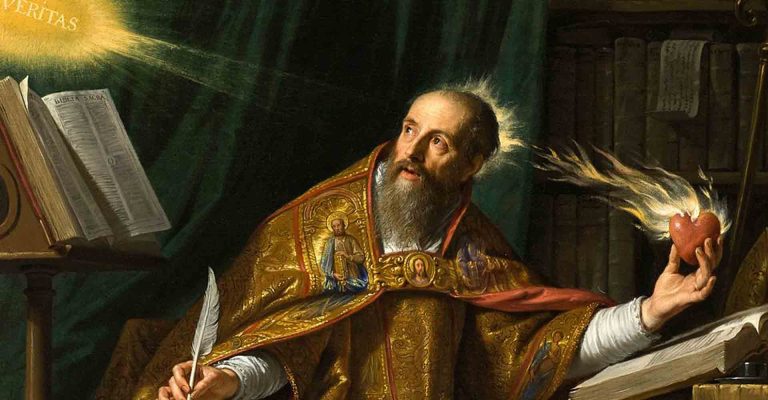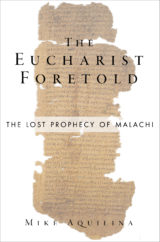By Mike Aquilina
Mike Aquilina is executive vice-president of the St. Paul Center and a contributing editor for Angelus News. He is author of more than fifty books, including The Eucharist Foretold: The Lost Prophecy of Malachi.

There’s no theologian more famous or more influential in the West than Augustine of Hippo. The story of his conversion, the Confessions, is one of the most famous Christian books outside the Bible itself, and simply taken as literature, it’s a masterpiece. Many critics would say it’s the first real autobiography: Augustine writes not just the events of his life but even more about the inner workings of his own soul. No one ever subjected himself to a more merciless self-examination.
Augustine was raised in North Africa by a Christian mother and a pagan father. His education prepared him to be a teacher of rhetoric, which could make him a comfortable living in those days. Religiously, though, he was an explorer. He spent a long time among the Manicheans, a sort of Gnostic sect who believed that the evil material world was always at war with the good spiritual world. Only after much searching—and many prayers from his mother—did Augustine find his way into the Christian Church.
But once he was in the Church, Augustine flourished. He used all the resources his classical education had given him. Before there even was a Renaissance, he was a Renaissance man: in a wide variety of fields he became an expert, with his treatise on music becoming the basis of musical education for centuries to come. But his biggest influence would be as a theologian. He became bishop of Hippo, a city near Carthage in Africa, and already in his lifetime he was sought out as one of the most important thinkers in the Church. Leaving volume after volume of writing, every Western theologian since his time—both Catholic and Protestant—owes a lot to Augustine.
By the time we get to Augustine, Christians are so familiar with the Malachi prophecy that Augustine simply takes it for granted. Of course the Eucharist is the offering Malachi was talking about. Who could doubt it? Augustine seldom even has to mention it. But when he’s preaching to a group of new Christians who have just been baptized, he thinks they ought to hear about it. They have never before shared in the Eucharist, but now they’re about to do it. So he gives them what amounts to a summary of what all the Christian writers before him have said about the Eucharist: this is the pure sacrifice foretold by Malachi. The sacrifices in Jerusalem were images of the greater sacrifice to come, but this is the one that is offered all over the world, as Malachi said it would be. This is a pure sacrifice, so there is no bloody victim, because our great High Priest offered himself as the victim, and what you are about to partake of is his body and blood.
All of the Old Testament points forward to the Christian Church, offering its pure oblation from the rising of the sun to its setting.
Like generations of Christians before him, St. Augustine also sees the prophecy of Malachi as one of the most important proof texts of Christianity. You know the Christians are right, because the prophets foresaw the Christian era so clearly all those centuries ago. And no one saw more clearly than Malachi.
For from the rising of the sun to its setting my name is great among the nations, and in every place incense is offered to my name, and a pure offering; for my name is great among the nations, says the Lord of hosts. (Mal 1:11)
You Might Also Like

One Old Testament passage seized the imagination of the early Church—and directed Christian hearts and minds toward the Eucharist. It was the oracle of Malachi 1:11, and it was cited (like Isaiah’s Suffering Servant oracles) to prove the identity of the Messiah through His Church and His Sacrament.
In The Eucharist Foretold: The Lost Prophecy of Malachi, Mike Aquilina reveals that the Messiah’s true identity—and the identity of the Eucharist—helps us find our identity as “catholic,” and will lead us to discover our roots in the religion of ancient Israel. To the early Christians, Malachi’s oracle defined who they were individually and as a Church.